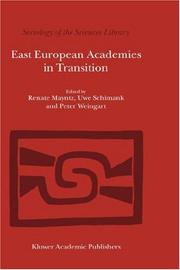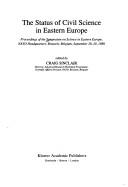| Listing 1 - 4 of 4 |
Sort by
|
Book
ISBN: 0192849840 0192666754 9780192849847 9780192849847 Year: 2022 Publisher: Oxford : Oxford university press,
Abstract | Keywords | Export | Availability | Bookmark
 Loading...
Loading...Choose an application
- Reference Manager
- EndNote
- RefWorks (Direct export to RefWorks)
This monograph explores how one of the largest geopolitical changes of the twentieth century-the dissolution of the Soviet Union-triggered and inspired the reconfiguration of the Soviet university. The reader is invited to engage in a historical and sociological sensemaking of radical and incremental changes affecting 69 former Soviet universities since the early 1990s. The monograph departs from traditional deficit-oriented, internalist explanations of change and illustrates how global flows of ideas, people, and finances have impacted higher education transformations in this region. It also identifies areas of persistence. The processes of marketisation, internationalisation, and academic liberation are analysed to show that universities have maintained certain traditions while adopting and internalising new ways of fulfilling their education and research functions. Soviet universities have survived chaotic processes of post-Soviet transformations and have self-stabilised with time. Most of them remain flagship institutions with large numbers of students and relatively high research productivity. At the same time, the majority of these universities operate in a top-down, one-man management environment with limited institutional autonomy and academic freedom. As the homes of intellectuals, universities represent a duality of opportunity and threat. Universities can nurture collective possibilities, imagining and bringing about a different future. At the same time, or perhaps because of this, the probability is high that universities will continue to be perceived as threats to governments with authoritarian inclinations. One message to take away from this monograph is that the time is ripe for former Soviet universities to loosen their last remaining chains.
378.4 <4-11> --- 378.4 <4-11> Universiteiten--Oost-Europa --- Universiteiten--Oost-Europa --- Colleges and universities --- Education, Higher --- Post-communism --- History
Book
ISBN: 9782802729334 9782802729341 2802729349 Year: 2011 Volume: *1 Publisher: Bruxelles Bruylant
Abstract | Keywords | Export | Availability | Bookmark
 Loading...
Loading...Choose an application
- Reference Manager
- EndNote
- RefWorks (Direct export to RefWorks)
378.4 <4-11> --- Universiteiten--Oost-Europa --- 378.4 <4-11> Universiteiten--Oost-Europa --- Higher education and state --- Universities and colleges --- Europe [Central ] --- Congresses --- E-books --- Higher education and state - Europe, Central - Congresses --- Universities and colleges - Europe, Central - Congresses

ISBN: 0792351681 9048150655 9401591210 Year: 1998 Publisher: Dordrecht Kluwer
Abstract | Keywords | Export | Availability | Bookmark
 Loading...
Loading...Choose an application
- Reference Manager
- EndNote
- RefWorks (Direct export to RefWorks)
When the socialist regime in Central and Eastern Europe (CEE) was overthrown around the end of the eighties, beginning of the nineties, an overall transforma tion of whole societies started. Not only the political and the economic systems of these countries, but all societal sectors underwent deep changes. These changes presented opportunities, but they also spelled trouble. On one hand, getting rid of stifling political control and excessive bureaucratic regulation was something which most members of these societies desired. On the other, it be came apparent very soon that the necessary and long hoped-for rebuilding of the economy, education, health care, the mass media, and science, too, was strongly restricted by the scarcity of financial resources. After a short period, during which opportunities were energetically taken up in a spirit of hope, came a long and still lasting time of growing troubles and despondency. Only in a few of the CEE countries have some glimpses of hope become visible recently; and it re mains to be seen whether these signals are reliable. Until now, therefore, the transformation dynamics of all societal sectors in all of the CEE countries have primarily been troublesome. This is surely true for the post-socialist research systems. I The demise of the communist party's abso lute rule over society has allowed researchers the public expression and the pur suit of goals whose common denominator has been a greater self-regulation of scientific research according to its own criteria and logic.
378.4 <4-11> --- Universiteiten--Oost-Europa --- Research --- Science and state --- Science --- Government policy --- Societies, etc. --- 378.4 <4-11> Universiteiten--Oost-Europa --- Societies, etc --- Natural science --- Science of science --- Sciences --- Science policy --- State and science --- State, The --- Science research --- Scientific research --- Information services --- Learning and scholarship --- Methodology --- Research teams --- Natural sciences --- Political science. --- History. --- Sociology. --- Political Science. --- History, general. --- Sociology, general. --- Social theory --- Social sciences --- Annals --- Auxiliary sciences of history --- Administration --- Civil government --- Commonwealth, The --- Government --- Political theory --- Political thought --- Politics --- Science, Political --- Science and state.

ISBN: 0792302672 9401069263 9400909713 Year: 1989 Publisher: Dordrecht Kluwer
Abstract | Keywords | Export | Availability | Bookmark
 Loading...
Loading...Choose an application
- Reference Manager
- EndNote
- RefWorks (Direct export to RefWorks)
378.4 <4-11> --- Research --- -Science and state --- -Technology and state --- -State and technology --- Technology --- Endowment of research --- Science and state --- Science --- Science policy --- State and science --- State, The --- Science research --- Scientific research --- Information services --- Learning and scholarship --- Methodology --- Research teams --- Universiteiten--Oost-Europa --- Congresses --- Government policy --- Council for Mutual Economic Assistance --- Consejo de Asistencia Mutua Económica --- Rat für Gegenseitige Wirtschaftshilfe --- Council for Economic Mutual Assistance --- C.E.M.A. --- CEMA --- Consiliul de Ajutor Economic Reciproc --- C.A.E.R. --- Rada Wzajemnej Pomocy Gospodarczej --- RWPG --- SĖV --- Sovet ėkonomicheskoĭ vzaimopomoshchi --- Komekon --- Kölcsönös Gazdasági Segítség Tanácsa --- C.A.E.M. --- Conseil d'assistance mutuelle économique --- CAME --- Sŭvet za ikonomicheska vzaimopomosht --- Rada vzájomnej hospodarskej pomoci --- Council for Mutual Economic Aid --- CAER --- C.O.M.E.C.O.N. --- Conseil d'assistance économique mutuelle --- Savet za uzajamnu ekonomsku pomoć --- CMEA --- Council of Mutual Economic Assistance --- REV --- Rada ekonomichnoï vzai︠e︡modopomohy --- Consejo de Ayuda Mutua Económica --- Consejo de Asistencia Económica Mutua --- Rada vzájemné hospodárské pomoci --- RVHP --- RGW --- KGST --- Ėdiĭn zasgiĭn kharilt︠s︡an tuslalt︠s︡a zȯvlȯl --- Savjet za uzajamnu ekonomsku pomoć --- Conseil d'aide économique mutuelle --- Taloudellisen keskinäisavun neuvosto --- Keizai Sōgo Enjo Kaigi --- Conseil d'entraide économique --- R.W.P.G. --- S.I.V. --- S.Ė.V. --- C.A.M.E.C.O.N. --- CAEM --- C.A.M.E. --- COMECON --- C.M.E.A. --- R.E.V. --- R.V.H.P. --- R.G.W. --- K.G.S.T. --- SIV --- CAMECON --- Hội đồng tương trợ kinh tế --- 経済相互援助会議 --- Congresses. --- Communist countries --- -Europe, Eastern --- East Europe --- Eastern Europe --- Iron curtain lands --- Russian satellites --- Second world (Communist countries) --- Soviet bloc --- Former communist countries --- Economic conditions --- -Congresses --- -Congresses. --- -Universiteiten--Oost-Europa --- 378.4 <4-11> Universiteiten--Oost-Europa --- Technology and state --- State and technology --- Europe, Eastern --- Europe [Eastern ] --- Council for Mutual Economic Assistance (CMEA) --- Monograph
| Listing 1 - 4 of 4 |
Sort by
|

 Search
Search Feedback
Feedback About UniCat
About UniCat  Help
Help News
News